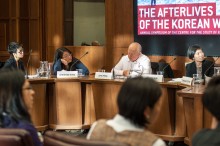An unresolved war in the Korean Peninsula continues to affect people’s lives even today. Korea’s geopolitical conditions have justified as state of emergency as a rule governing life. To address this issue, on October 24, 2014 the Centre for the Study of Korea and the Asian Institute invited four distinguished academics to present their papers on the “unfinished wars and conflicts of the past” as part of the two-day Afterlives of the Korean War symposium.
Dr. John Price from the University of Victoria focused on the involvement of Canadian troops in the Korean War. Whilst Canada prides itself at its historical support of the coalition forces, Dr. Price revealed several reports of racism, alongside those pointing towards crimes of war emanating from the Canadian camp. The reluctance of the Canadian government to investigate these claims, and the limited literature available in this regard made his lecture novel.
Dr. Monica Kim from New York University focused on American interventionism. The Korean War was the first example of international interventionism on part of the United States, which had just then emerged as a superpower in a bipolar world. This was the beginning of a dangerous path that the United States decided to tread on. Dr. Kim observed the Truman administration’s labeling of the war as “police action”, trivializing global intervention and instilling the United State’s position as the global “policeman”.
Dr. Christine Hong from University of California Santa Cruz, moving away from the arguments presented by the first two academics, spoke of the position of the military as a machine for equality. Genocidal violence attributed to the military provided a method, albeit being illiberal, for conditional racial inclusion. She alluded to the photos of Korean children as child mascots in miniature U.S. Army uniforms as a way of combining the idea of childlike innocence with racial equality, using the notion of military might to perpetuate it.
Dr. Kim Hosu from the City University of New York took a slightly different approach while addressing the idea of Korean geopolitics shaping its present. She spoke about the practice of Korean birth mothers giving children to up for transnational adoption. This practice commenced during the Korean war, due to understandable circumstances, but its continuation gives weight to the argument of the Korean Peninsula still suffering from the aftermath of the Korean War.
The lectures, despite being detached from each other in breadth and matter did intertwine with each other to provide the audience with a deeper understanding of the lingering affects of the Korean War. Despite the Cold War having ended globally with the collapse of the Soviet Union, Korea continues to struggle with its after affects.
-written by S. Taha H. Shah, a third year student in the Contemporary Asian Studies Program
This article is part of a series of articles written by undergraduate students affiliated with the Asian Institute about events hosted by the Asian Institute.




